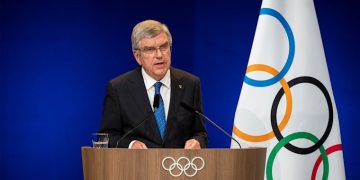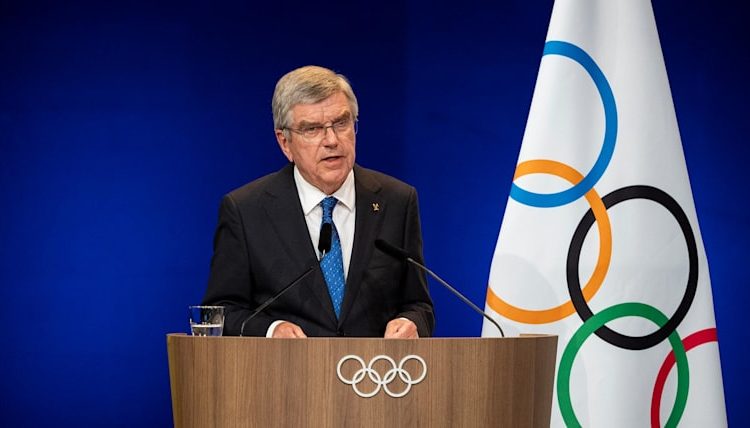The President of the International Olympic Committee (IOC) Thomas Bach arrives in the country today for a 2-day official visit.
The visit to Uganda is part of Bach’s farewell tour to five African countries, also including Senegal, South Africa, Lesotho and Rwanda, before the end of his tenure as IOC president, while assessing the progress of the committee’s efforts on the continent.
During his visit to Uganda, Thomas Bach is set to engage with Olympic athletes, leaders of sports federations, associations, and key stakeholders within the country’s Olympic and sports landscape.
His agenda includes meeting President Yoweri Museveni, the First Lady and Minister of Education and Sports Janet Museveni, and the Minister of State for Sports Peter Ogwang.
We take a deeper look into the life of the outgoing IOC president.
Thomas Bach was born on December 29, 1953, in Wurzburg, Germany. His early years were shaped by a passion for sports, particularly fencing, which he took up in his youth.
Growing up in Tauberbischofsheim, a town known for its elite fencing academy, Bach was introduced to the sport at a high level.
The fencing academy there was instrumental in shaping Germany’s top fencers, and Bach benefited from this environment, eventually competing internationally.
As a fencer, Bach specialised in the foil discipline and was a key member of the German national fencing team in the 1970s.
His career saw several notable achievements, the pinnacle being his gold medal at the 1976 Montreal Summer Olympics, where he competed in the team foil event.
In addition to his Olympic success, Bach’s fencing career included a team silver medal at the 1973 World Fencing Championships in Gothenburg, a team gold at the 1977 Championships in Buenos Aires, and a team bronze in the 1979 World Championships in Melbourne
Bach’s career spanned over a decade, and he competed in numerous national and international events, including winning back-to-back German Individual Foil Championships in 1977 and 1978.
He also won the 1978 European Cup of Champions, and his final international match took place in Shanghai in 1980.
After retiring from competitive fencing, Bach embarked on a Law degree and then transitioned into sports administration, where he first served as the German Olympic Sports Confederation (DOSB) president from 2006 until he resigned to run for IOC President in 2013.
Thomas Bach’s tenure as President of the International Olympic Committee (IOC) has been characterised by a focus on modernisation, inclusivity, and navigating significant global challenges.
Upon taking office, Bach set out a vision to revamp the Olympic movement, which culminated in the launch of the “Olympic Agenda 2020.”
This comprehensive set of reforms was aimed at making the Olympics more adaptable, affordable, and appealing to future host cities.
A key component was enhancing sustainability, encouraging hosts to make use of existing venues, and promoting gender equality by ensuring greater female participation in both the Games and leadership roles within the Olympic movement.
Bach’s leadership faced one of its greatest tests during the COVID-19 pandemic, which led to the unprecedented postponement of the Tokyo 2020 Olympics.
The Games were eventually held in 2021 under strict health protocols, and Bach was instrumental in ensuring the event took place despite logistical and health concerns, stressing the importance of unity and resilience.
In addition to navigating the pandemic, Bach has worked to expand the scope of the Olympic movement through the Youth Olympic Games and initiatives like the Refugee Olympic Team, which debuted in the Rio 2016 Olympics.
Moreover, Bach has championed the fight against doping, working closely with the World Anti-Doping Agency (WADA) to promote clean sports.
Bach’s presidency has also seen a renewed emphasis on human rights. He has been vocal about ensuring that future Olympic host cities comply with human rights standards, reinforcing the notion that the Games must not only celebrate sport but also reflect social progress.
In this vein, he led efforts to include more social responsibility clauses in contracts for host cities, aligning the Games with international standards of labour, sustainability, and equality.
His reforms under the “Olympic Agenda 2020+5,” which extends his original initiative, include adapting the Games to a changing world, with a greater emphasis on climate action, digitalization, and global collaboration.
Although Bach’s second term, re-elected in 2021, will end in 2025, he has already confirmed that he will step down at the end of this term, despite some calls for an extension.
Seven candidates are already vying to replace him.
Bach’s presidency will be remembered for its focus on modernisation, sustainability, and navigating the Games through one of the most challenging periods in recent history, leaving a lasting impact on the future of the Olympic movement.





























